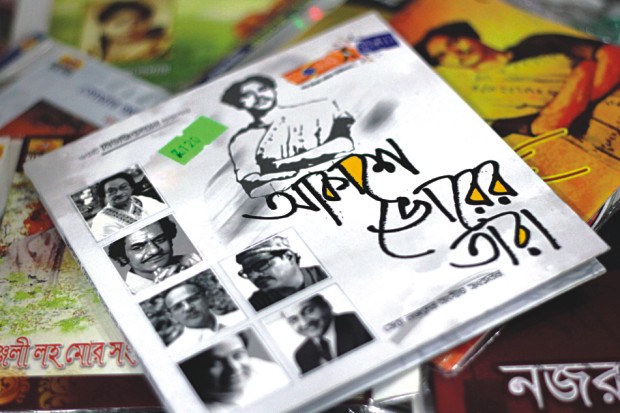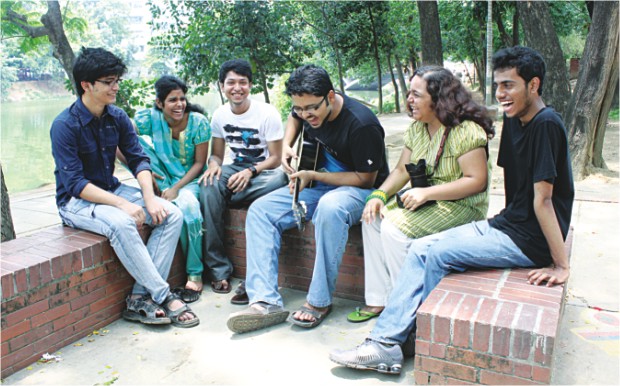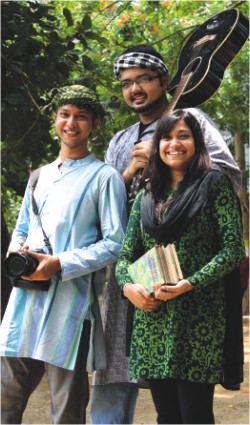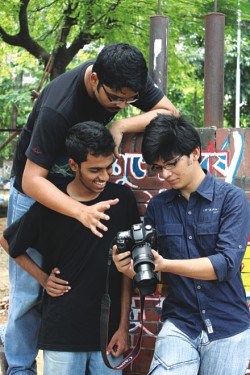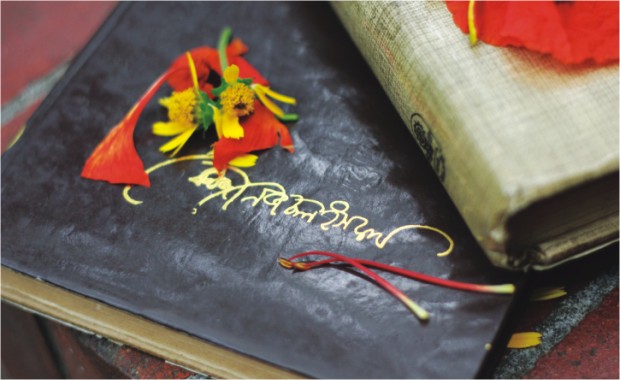| Home - Back Issues - The Team - Contact Us |
 Linking Young Minds Together |
| Volume 3 | Issue 20 | May 22, 2011 | |
|
Spotlight
Elita Karim The other day, a well-known theatre activist of the country noted how this is the age of re-makes and re-mixes. “Don't the young people know any better than to 'borrow' original ideas and re-make them into something they call their own?” he wondered aloud. “Why can't they work on their own ideas and bring out masterpieces?” The people at the adda (a get-together of friends), who had slowly taken a turn from the topic of upcoming summer nights, “there is nothing on Bangla TV nowadays,” to Kazi Nazrul Islam, they could not be exactly sure as to who the theatre activist was talking about. However, some of the younger ones in the group thought that he might have been referring to the re-make of the Nazrul Geeti, Kandari Hushiar, done by Artcell, one of the most popular heavy rock bands in Bangladesh right now.
In contrary to what the theatre activist was saying, there are many who believe that the band Artcell actually brought a whole new dimension to the world of music, re-make or not, especially for the young listeners who now have a thousand different options to choose from on their ipod. Thanks to the experts of Nazrul Geeti, a form of composition with strong lyrics by Kazi Nazrul Islam, for decades together, many young people found the interpretation of these compositions rigid and to an extent, unapproachable. However, the version made by Artcell and many more being made by other contemporary musicians are thankfully bringing back the eagerness of these youngsters to actually go on with their love for exploring music.
There might be a lot to learn from re-makes of the many forms of art - music, scripts, movies - but that is a different story all together. However, interestingly enough, Nazrul's compositions seem to have made their way into the hearts of the young people today, the way folk music did almost a decade ago when musicians like Habib and the band Bangla re-made age-old folk compositions. “Undoubtedly, Nazrul Geeti is probably one of the most brilliant creations in Bengali,” says 23-year-old Ishtiaque Hussain. “It has always been around; there is no reason to say that the form of music had disappeared. But maybe the form intimidates a lot of young people, which is why most of them think twice before listening to it.” Hussain is a student of Ahsanullah University and has been learning Nazrul Geeti for the last two years. Not only did Nazrul, the national poet of Bangladesh, create genius lyrics and poetry around a century ago or more, when he was a youngster himself, but Dukhu Miyah, as he was nicknamed, Nazrul still manages to inspire the young people today with his work mainly his rebellious thoughts put across through his words of revolution. Zaher Razzaque Monty is a part of a poetry recitation association in Dhaka University. Every week, the group meets up at the Teacher Student Centre (TSC) and recites poetry written by themselves or other poets. “I like to recite poems by different poets, new or old,” says the 24-year-old Economics student. “There are also times when we all recite together; using different pitches in voice, and that is best done when you recite the poetry written by Nazrul. One of the poems that we usually like recite together is his 'Bidrohi'.”
In the famous poem, 'Bidrohi,' Nazrul had managed to attain strong popularity because of the rebellious nature, words and not to mention the rhythm that he had included in the poem. It was considered to be one of the most powerful literary contributions to the anti-British movements which were emerging at that time in Bengal and eventually, all over India. The youth today look for an idol, and because they keep an eye out for such a person around them in the present, seldom do they think about taking a peek into history. However, those who did, found Nazrul to be quite an inspiration. “Nazrul did what he wanted to do and nothing stopped him from living his life, in his own way,” says Shabana Khondekar, a student at the Nazrul Academy. “Despite the fact that he was born in a conventional Bengali Muslim family, his love for the theatre and music was not ignored by him. He wrote poetry, plays, short stories and what not. I wish we could all be like him!” Some young people even seem to think that Nazrul had a wild streak, which would have made him extremely popular if he had been a university student today! “I think he was a complete romantic!” says Tina Arpita Gomes, a 25-year-old MBA student. “You can just read his work and understand that his soul was on fire! His words reflect love, sex, passion and also the urge to unite people all around him and voice out against the imperialists. He was definitely a genius. Otherwise, how could he have felt such passion for people, for his country and written such powerful words at such a young age and that too when he had not even had a proper schooling?”
Nazrul might be a glamorous personality to many young people today, however, he is also someone who voiced out against the religious barriers between people at the time. He was also very vocal about women's rights and in many of his works, tried to define the strong roles played by women in society, which, unfortunately, went unnoticed or were purposely ignored. According to him, life was not as complicated as everyone made it seem -- half of this beautiful world has been built by the men, while the other half by the women, he theorised in one of his poems, 'Nari,' which also became one of his very famous works. Clearly, Nazrul was a true artist at heart and was a passionate poet. He has written on almost everything a young person today can relate to - patriotism, religion, mysticism, the fun-filled youth and not to mention love for one's beloved. Studying him would not only be taking the young reader on a roller coaster ride through Nazrul's mind, but also would inspire him or her enough to move forward and do something on his or her own. The Nazrul Academy Library in Dhaka holds plenty of information on this great poet, for young people who want to learn more about him, his life and his work. You never know, a little bit of his 'genius' might just rub off on you!
Copyright (R) thedailystar.net 2011 |
||||||
